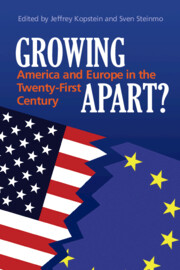Book contents
- Frontmatter
- Contents
- Contributors
- Acknowledgments
- Growing Apart?
- Introduction: Growing Apart? America and Europe in the Twenty-First Century
- 1 The Religious Divide: Why Religion Seems to Be Thriving in the United States and Waning in Europe
- 2 Value Change in Europe and North America: Convergence or Something Else?
- 3 On Different Planets: News Media in the United States and Europe
- 4 One Ring to Bind Them All: American Power and Neoliberal Capitalism
- 5 Spreading the Word: The Diffusion of American Conservatism in Europe and Beyond
- 6 Work, Welfare, and Wanderlust: Immigration and Integration in Europe and North America
- 7 Lost in Translation: The Transatlantic Divide over Diplomacy
- 8 The Atlantic Divide in Historical Perspective: A View from Europe
- Index
8 - The Atlantic Divide in Historical Perspective: A View from Europe
Published online by Cambridge University Press: 19 January 2010
- Frontmatter
- Contents
- Contributors
- Acknowledgments
- Growing Apart?
- Introduction: Growing Apart? America and Europe in the Twenty-First Century
- 1 The Religious Divide: Why Religion Seems to Be Thriving in the United States and Waning in Europe
- 2 Value Change in Europe and North America: Convergence or Something Else?
- 3 On Different Planets: News Media in the United States and Europe
- 4 One Ring to Bind Them All: American Power and Neoliberal Capitalism
- 5 Spreading the Word: The Diffusion of American Conservatism in Europe and Beyond
- 6 Work, Welfare, and Wanderlust: Immigration and Integration in Europe and North America
- 7 Lost in Translation: The Transatlantic Divide over Diplomacy
- 8 The Atlantic Divide in Historical Perspective: A View from Europe
- Index
Summary
Introduction
The intensity of the transatlantic crisis over the U.S.-led intervention in Iraq in early 2003 has put into question on both sides of the Atlantic the relevance and the future prospects of the Euro–American alliance in the post–Cold War, post–September 11 world.
The section “Europe and the Politics of Atlanticism” analyzes the different views held in Europe, particularly in France, about the transatlantic relationship, both before and since the Iraqi crisis. The next two sections, “Continental Drift” and “A Resilient Bond,” present my own analysis of that crisis, its underlying reasons, and its ultimate impact. Finally, the section “Friends Again: Quick Fix or Strategic Shift?” discusses the present state and future prospects of the Atlantic partnership four years after the invasion of Iraq, in light of the change that occurred in the global geopolitical paradigm since then.
Europe and the Politics of Atlanticism
The range of current European positions about the Atlantic partnership cannot be properly understood without the historical background of the Cold War period, when such positions were first articulated. During the nearly four decades of the East–West confrontation, the relevance of the Atlantic Alliance and the legitimacy of Europe's commitment thereto were, for obvious reasons, not matters for debate. Nevertheless, there were at least three distinct viewpoints within Europe on the subject.
At one end of the spectrum, the British position was inherently Atlanticist, in the sense that Britain placed the Alliance and the “special relationship” with the United States at the core of its foreign and defense policies, over and above its membership in the European Community.
- Type
- Chapter
- Information
- Growing Apart?America and Europe in the 21st Century, pp. 211 - 224Publisher: Cambridge University PressPrint publication year: 2007



